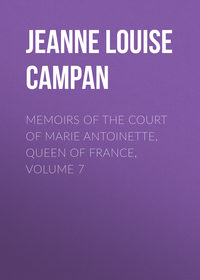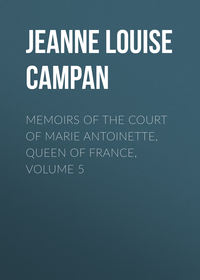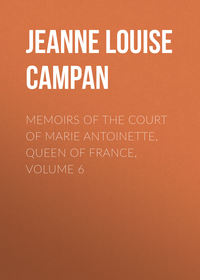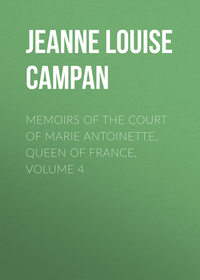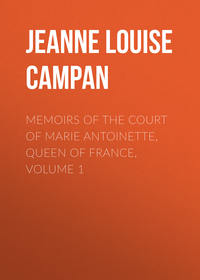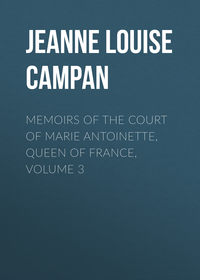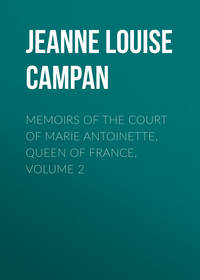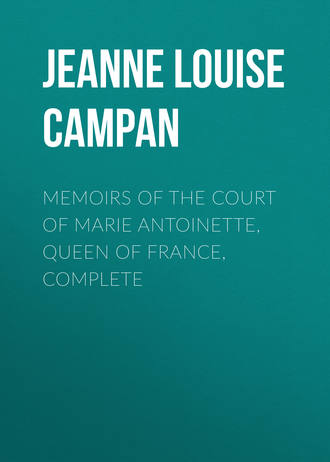 полная версия
полная версияMemoirs of the Court of Marie Antoinette, Queen of France, Complete
On returning into her chamber, the Queen, standing about the middle of it, surrounded by the superintendent, the ladies of honour and tirewomen, her ladies of the palace, the chevalier d’honneur, the chief equerry, her clergy ready to attend her to mass, and the Princesses of the royal family who happened to come, accompanied by all their chief attendants and ladies, passed in order into the gallery as in going to mass. The Queen’s signatures were generally given at the moment of entry into the chamber. The secretary for orders presented the pen. Presentations of colonels on taking leave were usually made at this time. Those of ladies, and, such as had a right to the tabouret, or sitting in the royal presence, were made on Sunday evenings before card-playing began, on their coming in from paying their respects. Ambassadors were introduced to the Queen on Tuesday mornings, accompanied by the introducer of ambassadors on duty, and by M. de Sequeville, the secretary for the ambassadors. The introducer in waiting usually came to the Queen at her toilet to apprise her of the presentations of foreigners which would be made. The usher of the chamber, stationed at the entrance, opened the folding doors to none but the Princes and Princesses of the royal family, and announced them aloud. Quitting his post, he came forward to name to the lady of honour the persons who came to be presented, or who came to take leave; that lady again named them to the Queen at the moment they saluted her; if she and the tirewoman were absent, the first woman took the place and did that duty. The ladies of the bedchamber, chosen solely as companions for the Queen, had no domestic duties to fulfil, however opinion might dignify such offices. The King’s letter in appointing them, among other instructions of etiquette, ran thus: “having chosen you to bear the Queen company.” There were hardly any emoluments accruing from this place.
The Queen heard mass with the King in the tribune, facing the grand altar and the choir, with the exception of the days of high ceremony, when their chairs were placed below upon velvet carpets fringed with gold. These days were marked by the name of grand chapel day.
The Queen named the collector beforehand, and informed her of it through her lady of honour, who was besides desired to send the purse to her. The collectors were almost always chosen from among those who had been recently presented. After returning from mass the Queen dined every Sunday with the King only, in public in the cabinet of the nobility, a room leading to her chamber. Titled ladies having the honours sat during the dinner upon folding-chairs placed on each side of the table. Ladies without titles stood round the table; the captain of the Guards and the first gentleman of the chamber were behind the King’s chair; behind that of the Queen were her first maitre d’hotel, her chevalier d’honneur, and the chief equerry. The Queen’s maitre d’hotel was furnished with a large staff, six or seven feet in length, ornamented with golden fleurs-de-lis, and surmounted by fleurs-de-lis in the form of a crown. He entered the room with this badge of his office to announce that the Queen was served. The comptroller put into his hands the card of the dinner; in the absence of the maitre d’hotel he presented it to the Queen himself, otherwise he only did him the honours of the service. The maitre d’hotel did not leave his place, he merely gave the orders for serving up and removing; the comptroller and gentlemen serving placed the various dishes upon the table, receiving them from the inferior servants.
The Prince nearest to the crown presented water to wash the King’s hands at the moment he placed himself at table, and a princess did the same service to the Queen.
The table service was formerly performed for the Queen by the lady of honour and four women in full dress; this part of the women’s service was transferred to them on the suppression of the office of maids of honour. The Queen put an end to this etiquette in the first year of her reign. When the dinner was over the Queen returned without the King to her apartment with her women, and took off her hoop and train.
This unfortunate Princess, against whom the opinions of the French people were at length so much excited, possessed qualities which deserved to obtain the greatest popularity. None could doubt this who, like myself, had heard her with delight describe the patriarchal manners of the House of Lorraine. She was accustomed to say that, by transplanting their manners into Austria, the Princes of that house had laid the foundation of the unassailable popularity enjoyed by the imperial family. She frequently related to me the interesting manner in which the Ducs de Lorraine levied the taxes. “The sovereign Prince,” said she, “went to church; after the sermon he rose, waved his hat in the air, to show that he was about to speak, and then mentioned the sum whereof he stood in need. Such was the zeal of the good Lorrainers that men have been known to take away linen or household utensils without the knowledge of their wives, and sell them to add the value to their contribution. It sometimes happened, too, that the Prince received more money than he had asked for, in which case he restored the surplus.”
All who were acquainted with the Queen’s private qualities knew that she equally deserved attachment and esteem. Kind and patient to excess in her relations with her household, she indulgently considered all around her, and interested herself in their fortunes and in their pleasures., She had, among her women, young girls from the Maison de St. Cyr, all well born; the Queen forbade them the play when the performances were not suitable; sometimes, when old plays were to be represented, if she found she could not with certainty trust to her memory, she would take the trouble to read them in the morning, to enable her to decide whether the girls should or should not go to see them,—rightly considering herself bound to watch over their morals and conduct.
CHAPTER VI
During the first few months of his reign Louis XVI. dwelt at La Muette, Marly, and Compiegne. When settled at Versailles he occupied himself with a general examination of his grandfather’s papers. He had promised the Queen to communicate to her all that he might discover relative to the history of the man with the iron mask, who, he thought, had become so inexhaustible a source of conjecture only in consequence of the interest which the pen of a celebrated writer had excited respecting the detention of a prisoner of State, who was merely a man of whimsical tastes and habits.
I was with the Queen when the King, having finished his researches, informed her that he had not found anything among the secret papers elucidating the existence of this prisoner; that he had conversed on the matter with M. de Maurepas, whose age made him contemporary with the epoch during which the story must have been known to the ministers; and that M. de Maurepas had assured him he was merely a prisoner of a very dangerous character, in consequence of his disposition for intrigue. He was a subject of the Duke of Mantua, and was enticed to the frontier, arrested there, and kept prisoner, first at Pignerol, and afterwards in the Bastille. This transfer took place in consequence of the appointment of the governor of the former place to the government of the latter. It was for fear the prisoner should profit by the inexperience of a new governor that he was sent with the Governor of Pignerol to the Bastille.
Such was, in fact, the truth about the man on whom people have been pleased to fix an iron mask. And thus was it related in writing, and published by M. – twenty years ago. He had searched the archives of the Foreign Office, and laid the real story before the public; but the public, prepossessed in favour of a marvellous version, would not acknowledge the authenticity of his account. Every man relied upon the authority of Voltaire; and it was believed that a natural or a twin brother of Louis XIV. lived many years in prison with a mask over his face. The story of this mask, perhaps, had its origin in the old custom, among both men and women in Italy, of wearing a velvet mask when they exposed themselves to the sun. It is possible that the Italian captive may have sometimes shown himself upon the terrace of his prison with his face thus covered. As to the silver plate which this celebrated prisoner is said to have thrown from his window, it is known that such a circumstance did happen, but it happened at Valzin, in the time of Cardinal Richelieu. This anecdote has been mixed up with the inventions respecting the Piedmontese prisoner.
In this survey of the papers of Louis XV. by his grandson some very curious particulars relative to his private treasury were found. Shares in various financial companies afforded him a revenue, and had in course of time produced him a capital of some amount, which he applied to his secret expenses. The King collected his vouchers of title to these shares, and made a present of them to M. Thierry de Ville d’Avray, his chief valet de chambre.
The Queen was desirous to secure the comfort of Mesdames, the daughters of Louis XV., who were held in the highest respect. About this period she contributed to furnish them with a revenue sufficient to provide them an easy, pleasant existence: The King gave them the Chateau of Bellevue; and added to the produce of it, which was given up to them, the expenses of their table and equipage, and payment of all the charges of their household, the number of which was even increased. During the lifetime of Louis XV., who was a very selfish prince, his daughters, although they had attained forty years of age, had no other place of residence than their apartments in the Chateau of Versailles; no other walks than such as they could take in the large park of that palace; and no other means of gratifying their taste for the cultivation of plants but by having boxes and vases, filled with them, in their balconies or their closets. They had, therefore, reason to be much pleased with the conduct of Marie Antoinette, who had the greatest influence in the King’s kindness towards his aunts.
Paris did not cease, during the first years of the reign, to give proofs of pleasure whenever the Queen appeared at any of the plays of the capital. At the representation of “Iphigenia in Aulis,” the actor who sang the words, “Let us sing, let us celebrate our Queen!” which were repeated by the chorus, directed by a respectful movement the eyes of the whole assembly upon her Majesty. Reiterated cries of ‘Bis’! and clapping of hands, were followed by such a burst of enthusiasm that many of the audience added their voices to those of the actors in order to celebrate, it might too truly be said, another Iphigenia. The Queen, deeply affected, covered her eyes with her handkerchief; and this proof of sensibility raised the public enthusiasm to a still higher pitch.
The King gave Marie Antoinette Petit Trianon.
[The Chateau of Petit Trianon, which was built for Louis XV., was not remarkably handsome as a building. The luxuriance of the hothouses rendered the place agreeable to that Prince. He spent a few days there several times in the year. It was when he was setting off from Versailles for Petit Trianon that he was struck in the side by the knife of Damiens, and it was there that he was attacked by the smallpox, of which he died on the 10th of May, 1774.—MADAME CAMPAN.]
Henceforward she amused herself with improving the gardens, without allowing any addition to the building, or any change in the furniture, which was very shabby, and remained, in 1789, in the same state as during the reign of Louis XV. Everything there, without exception, was preserved; and the Queen slept in a faded bed, which had been used by the Comtesse du Barry. The charge of extravagance, generally made against the Queen, is the most unaccountable of all the popular errors respecting her character. She had exactly the contrary failing; and I could prove that she often carried her economy to a degree of parsimony actually blamable, especially in a sovereign. She took a great liking for Trianon, and used to go there alone, followed by a valet; but she found attendants ready to receive her,—a concierge and his wife, who served her as femme de chambre, women of the wardrobe, footmen, etc.
When she first took possession of Petit Trianon, it was reported that she changed the name of the seat which the King had given her, and called it Little Vienna, or Little Schoenbrunn. A person who belonged to the Court, and was silly enough to give this report credit, wishing to visit Petit Trianon with a party, wrote to M. Campan, requesting the Queen’s permission to do so. In his note he called Trianon Little Vienna. Similar requests were usually laid before the Queen just as they were made: she chose to give the permissions to see her gardens herself, liking to grant these little favours. When she came to the words I have quoted she was very, much offended, and exclaimed, angrily, that there were too many, fools ready, to aid the malicious; that she had been told of the report circulated, which pretended that she had thought of nothing but her own country, and that she kept an Austrian heart, while the interests of France alone ought to engage her. She refused the request so awkwardly made, and desired M. Campan to reply, that Trianon was not to be seen for some time, and that the Queen was astonished that any man in good society should believe she would do so ill-judged a thing as to change the French names of her palaces to foreign ones.
Before the Emperor Joseph II’s first visit to France the Queen received a visit from the Archduke Maximilian in 1775. A stupid act of the ambassador, seconded on the part of the Queen by the Abbe de Vermond, gave rise at that period to a discussion which offended the Princes of the blood and the chief nobility of the kingdom. Travelling incognito, the young Prince claimed that the first visit was not due from him to the Princes of the blood; and the Queen supported his pretension.
From the time of the Regency, and on account of the residence of the family of Orleans in the bosom of the capital, Paris had preserved a remarkable degree of attachment and respect for that branch of the royal house; and although the crown was becoming more and more remote from the Princes of the House of Orleans, they had the advantage (a great one with the Parisians) of being the descendants of Henri IV. An affront to that popular family was a serious ground of dislike to the Queen. It was at this period that the circles of the city, and even of the Court, expressed themselves bitterly about her levity, and her partiality for the House of Austria. The Prince for whom the Queen had embarked in an important family quarrel—and a quarrel involving national prerogatives—was, besides, little calculated to inspire interest. Still young, uninformed, and deficient in natural talent, he was always making blunders.
He went to the Jardin du Roi; M. de Buffon, who received him there, offered him a copy of his works; the Prince declined accepting the book, saying to M. de Buffon, in the most polite manner possible, “I should be very sorry to deprive you of it.”
[Joseph II, on his visit to France, also went to see M. de Buffon, and said to that celebrated man, “I am come to fetch the copy of your works which my brother forgot.”—NOTE BY THE EDITOR.]
It may be supposed that the Parisians were much entertained with this answer.
The Queen was exceedingly mortified at the mistakes made by her brother; but what hurt her most was being accused of preserving an Austrian heart. Marie Antoinette had more than once to endure that imputation during the long course of her misfortunes. Habit did not stop the tears such injustice caused; but the first time she was suspected of not loving France, she gave way to her indignation. All that she could say on the subject was useless; by seconding the pretensions of the Archduke she had put arms into her enemies’ hands; they were labouring to deprive her of the love of the people, and endeavoured, by all possible means, to spread a belief that the Queen sighed for Germany, and preferred that country to France.
Marie Antoinette had none but herself to rely on for preserving the fickle smiles of the Court and the public. The King, too indifferent to serve her as a guide, as yet had conceived no love for her, notwithstanding the intimacy that grew between them at Choisy. In his closet Louis XVI. was immersed in deep study. At the Council he was busied with the welfare of his people; hunting and mechanical occupations engrossed his leisure moments, and he never thought on the subject of an heir.
The coronation took place at Rheims, with all the accustomed pomp. At this period the people’s love for Louis XVI. burst forth in transports not to be mistaken for party demonstrations or idle curiosity. He replied to this enthusiasm by marks of confidence, worthy of a people happy in being governed by a good King; he took a pleasure in repeatedly walking without guards, in the midst of the crowd which pressed around him, and called down blessings on his head. I remarked the impression made at this time by an observation of Louis XVI. On the day of his coronation he put his hand up to his head, at the moment of the crown being placed upon it, and said, “It pinches me.” Henri III. had exclaimed, “It pricks me.” Those who were near the King were struck with the similarity between these two exclamations, though not of a class likely to be blinded by the superstitious fears of ignorance.
While the Queen, neglected as she was, could not even hope for the happiness of being a mother, she had the mortification of seeing the Comtesse d’Artois give birth to the Duc d’Angouleme.
Custom required that the royal family and the whole Court should be present at the accouchement of the Princesses; the Queen was therefore obliged to stay a whole day in her sister-in-law’s chamber. The moment the Comtesse d’Artois was informed a prince was born, she put her hand to her forehead and exclaimed with energy, “My God, how happy I am!” The Queen felt very differently at this involuntary and natural exclamation. Nevertheless, her behaviour was perfect. She bestowed all possible marks of tenderness upon the young mother, and would not leave her until she was again put into bed; she afterwards passed along the staircase, and through the hall of the guards, with a calm demeanour, in the midst of an immense crowd. The poissardes, who had assumed a right of speaking to sovereigns in their own vulgar language, followed her to the very doors of her apartments, calling out to her with gross expressions, that she ought to produce heirs. The Queen reached her inner room, hurried and agitated; he shut herself up to weep with me alone, not from jealousy of her sister-in-law’s happiness,—of that he was incapable,—but from sorrow at her own situation.
Deprived of the happiness of giving an heir to the crown, the Queen endeavoured to interest herself in the children of the people of her household. She had long been desirous to bring up one of them herself, and to make it the constant object of her care. A little village boy, four or five years old, full of health, with a pleasing countenance, remarkably large blue eyes, and fine light hair, got under the feet of the Queen’s horses, when she was taking an airing in a calash, through the hamlet of St. Michel, near Louveciennes. The coachman and postilions stopped the horses, and the child was rescued without the slightest injury. Its grandmother rushed out of the door of her cottage to take it; but the Queen, standing up in her calash and extending her arms, called out that the child was hers, and that destiny had given it to her, to console her, no doubt, until she should have the happiness of having one herself. “Is his mother alive?” asked the Queen. “No, Madame; my daughter died last winter, and left five small children upon my hands.” “I will take this one, and provide for all the rest; do you consent?” “Ah, Madame, they are too fortunate,” replied the cottager; “but Jacques is a bad boy. I hope he will stay with you!” The Queen, taking little Jacques upon her knee, said that she would make him used to her, and gave orders to proceed. It was necessary, however, to shorten the drive, so violently did Jacques scream, and kick the Queen and her ladies.
The arrival of her Majesty at her apartments at Versailles, holding the little rustic by the hand, astonished the whole household; he cried out with intolerable shrillness that he wanted his grandmother, his brother Louis, and his sister Marianne; nothing could calm him. He was taken away by the wife of a servant, who was appointed to attend him as nurse. The other children were put to school. Little Jacques, whose family name was Armand, came back to the Queen two days afterwards; a white frock trimmed with lace, a rose-coloured sash with silver fringe, and a hat decorated with feathers, were now substituted for the woollen cap, the little red frock, and the wooden shoes. The child was really very beautiful. The Queen was enchanted with him; he was brought to her every morning at nine o’clock; he breakfasted and dined with her, and often even with the King. She liked to call him my child, and lavished caresses upon him, still maintaining a deep silence respecting the regrets which constantly occupied her heart.
[This little unfortunate was nearly twenty in 1792; the fury of the people and the fear of being thought a favourite of the Queen’s had made him the most sanguinary terrorist of Versailles. He was killed at the battle of Jemappes.]
This child remained with the Queen until the time when Madame was old enough to come home to her august mother, who had particularly taken upon herself the care of her education.
The Queen talked incessantly of the qualities which she admired in Louis XVI., and gladly attributed to herself the slightest favourable change in his manner; perhaps she displayed too unreservedly the joy she felt, and the share she appropriated in the improvement. One day Louis XVI. saluted her ladies with more kindness than usual, and the Queen laughingly said to them, “Now confess, ladies, that for one so badly taught as a child, the King has saluted you with very good grace!”
The Queen hated M. de La Vauguyon; she accused him alone of those points in the habits, and even the sentiments, of the King which hurt her. A former first woman of the bedchamber to Queen Maria Leczinska had continued in office near the young Queen. She was one of those people who are fortunate enough to spend their lives in the service of kings without knowing anything of what is passing at Court. She was a great devotee; the Abbe Grisel, an ex-Jesuit, was her director. Being rich from her savings and an income of 50,000 livres, she kept a very good table; in her apartment, at the Grand Commun, the most distinguished persons who still adhered to the Order of Jesuits often assembled. The Duc de La Vauguyon was intimate with her; their chairs at the Eglise des Reollets were placed near each other; at high mass and at vespers they sang the “Gloria in Excelsis” and the “Magnificat” together; and the pious virgin, seeing in him only one of God’s elect, little imagined him to be the declared enemy of a Princess whom she served and revered. On the day of his death she ran in tears to relate to the Queen the piety, humility, and repentance of the last moments of the Duc de La Vauguyon. He had called his people together, she said, to ask their pardon. “For what?” replied the Queen, sharply; “he has placed and pensioned off all his servants; it was of the King and his brothers that the holy man you bewail should have asked pardon, for having paid so little attention to the education of princes on whom the fate and happiness of twenty-five millions of men depend. Luckily,” added she, “the King and his brothers, still young, have incessantly laboured to repair the errors of their preceptor.”
The progress of time, and the confidence with which the King and the Princes, his brothers, were inspired by the change in their situation since the death of Louis XV., had developed their characters. I will endeavour to depict them.
The features of Louis XVI. were noble enough, though somewhat melancholy in expression; his walk was heavy and unmajestic; his person greatly neglected; his hair, whatever might be the skill of his hairdresser, was soon in disorder. His voice, without being harsh, was not agreeable; if he grew animated in speaking he often got above his natural pitch, and became shrill. The Abbe de Radonvilliers, his preceptor, one of the Forty of the French Academy, a learned and amiable man, had given him and Monsieur a taste for study. The King had continued to instruct himself; he knew the English language perfectly; I have often heard him translate some of the most difficult passages in Milton’s poems. He was a skilful geographer, and was fond of drawing and colouring maps; he was well versed in history, but had not perhaps sufficiently studied the spirit of it. He appreciated dramatic beauties, and judged them accurately. At Choisy, one day, several ladies expressed their dissatisfaction because the French actors were going to perform one of Moliere’s pieces. The King inquired why they disapproved of the choice. One of them answered that everybody must admit that Moliere had very bad taste; the King replied that many things might be found in Moliere contrary to fashion, but that it appeared to him difficult to point out any in bad taste?


